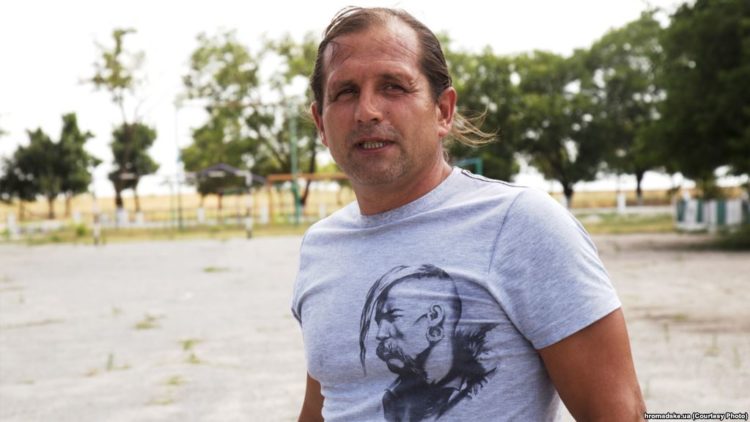Yuriy Soloshenko and Gennadiy Afanasyev, two Ukrainians who were illegally imprisoned in Russia on political charges, were returned to Ukraine on 14 June 2016. The men who spent two years in jail on trumped-up charges were exchanged for two Ukrainians who were accused of being supplemental to pro-Russian separatism in Ukraine. While much is known about the case of 25-year old Afanasyev, who the Russian human rights center Memorial declared a political prisoner, details about the case of Soloshenko emerged only recently. Zoya Svetova in a publication on Open Russia shed some light on how a 74-year-old man was accused of spying in Russia.
FSB operation developed to arrest a pensioner, former director of a disbanded Ukrainian military factory
If the sentence is to be believed, Soloshenko's Russian partners Konstantin Kolegov and Boris Demyanov appealed to the FSB, reporting that the Ukrainian citizen was interested in details for a S-300 antiaircraft missile system and their subsequent export to Ukraine. After that, the FSB developed a special operation to detain him. Soloshenko himself in a letter sent to Ms. Svetlova from prison told how he was lured to Moscow and accused of espionage.
Yuriy Soloshenko is the former director of Znamia, a military factory in the Ukrainian city of Poltava that stopped working in 2012 but continued selling old produce from warehouses.

After retiring in 2010, Soloshenko continued consulting his Russian partners about the electronics that Znamia produced earlier. His Russian colleague Kolegov with whom Soloshenko had been working with for 12 years, invited him to visit Moscow and verify the quality of old Znamia products that they purchased from warehouses, promising to pay a good fee.
However, when he arrived at the Moscow office on 5 August 2014, he was pinned to the wall by an FSB operative. He was searched; his two phones were removed and placed into a plastic bag together with some sheets of paper, asserting that they were on Soloshenko. He was accused of allegedly wanting to steal secret documents from Russia - the documents themselves being designs of C-300 antiaircraft systems. The claim itself is absurd - the systems are in use by the Armed Forces of Ukraine and the components are produced at the Generator plant in Kyiv. According to Mr.Soloshenko, these documents have already been in Ukraine starting from the 1980's.

These papers would be the main "proof" of the prosecution, which accused Yuriy Soloshenko of spying and stealing secret documents away to Ukraine, keeping the elderly Ukrainian in a prison for two years until finally exchanging him for two Ukrainians convicted for fostering pro-Russian separatism.
Read more: Afanasyev and Soloshenko: How the FSB breaks prisoners
In a letter to Zoya Svetlova, Yuriy Soloshenko gives an explanation for what happened.
Ordinary Russian graft
At first, Znamia's cooperation with the Russian Defense sector was simple - Znamia concluded direct contracts with the Russian Ministry of Defense and received payments from the state treasury. This simple scheme was imperfect from the viewpoint of some Russian officials - it was impossible to steal state money. Which is why the Head of the Department of Defense Procurement at Roselektronika Kolegov, who was responsible for distributing orders and considered that he should receive dividends from factory directors for giving them state deals, came up with the idea of secondary suppliers - private companies. Kolegov would make an order to Znamia, telling Soloshenko that he could purchase the items from the factory only from a secondary supplier at prices that were three times lower than similar Russian goods. As the Russian MoD was its only customer, Znamia was happy for any order. The secondary supplier later sold the items to the MoD at prices 2-3 higher, with Kolegov earning on the difference.
This scheme worked until the Russian governments took steps to fight such graft schemes, and Kolegov was unmasked. Soloshenko supposes that in order to win over some leniency, Kolegov proposed to expose a hardened foreign spy.
"At the trial, Kolegov portrayed himself as a great [Russian] patriot and said that he decided to send me to jail, so that I, using my connections, would not purchase Russian secret weapons for a hostile state," Soloshenko wrote.
At that time, Russian propaganda was already working in overdose to convince Russians that it is Ukraine that is a hostile state to Russia, while Russia would be sending in military personnel and weapons to fuel the conflict in Donbas, after having invaded Crimea.
"Investigative actions were not carried out in my case at all. Nobody tried to prove what is impossible because it did not exist. When the duration of the investigation came to an end (9-10 months), I was offered a deal: I will plead guilty, they will change the measure of restraint to house arrest, I live in Moscow at my friend's place, and then the court would issue me a suspended sentence."
Soloshenko pleaded guilty, but he was deceived by the investigators - the 74-year old man was sentenced to 6 years in prison for "spying," until he was exchanged together with Afanasyev in a Russia-Ukraine swapping deal.
"Secret" klystrons openly sold in Russia

According to military expert Igor Sutiagin, there is nothing secret about the equipment that Soloshenko was accused of trying to acquire classified data of. The klystron generator KG-3, klystron amplifier KU-137 and klystron amplifier KIU-43, mentioned in his verdict, are no secret for either Russia or Ukraine. The website of the Ukrainian "Generator Factory" located in Kyiv states that it repairs these klystrons, electron tubes that generate or amplify microwaves by velocity modulation, meaning that this technology is widely used in Ukraine. Apart from that, supposedly "secret" klystrons are openly sold in Russia.
An expert that will state that information associated with these devices is a state secret according to the "List of information classified as a state secret." The accommodating expert can always say that klystrons can be used to create new weapons systems, and the judge or investigator can say that they have no reason to not believe the expert.
Igor Sutiagin considers that this is what happened with Yuriy Soloshenko.





